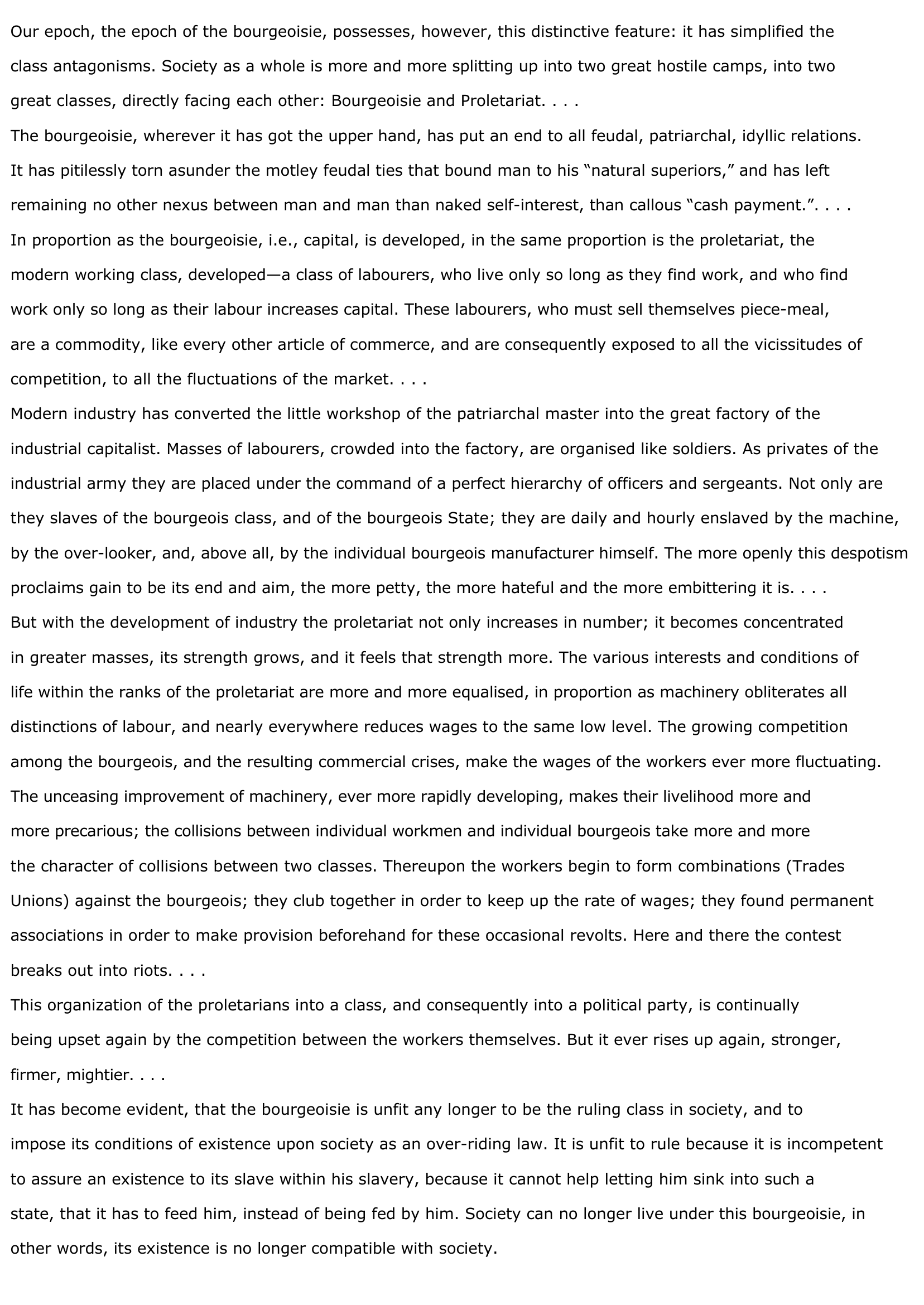Candidature au poste d'accompagnateur-éducateur.
Publié le 22/02/2012

Extrait du document
«
Our epoch, the epoch of the bourgeoisie, possesses, however, this distinctive feature: it has simplified the
class antagonisms.
Society as a whole is more and more splitting up into two great hostile camps, into two
great classes, directly facing each other: Bourgeoisie and Proletariat.
.
.
.
The bourgeoisie, wherever it has got the upper hand, has put an end to all feudal, patriarchal, idyllic relations.
It has pitilessly torn asunder the motley feudal ties that bound man to his “natural superiors,” and has left
remaining no other nexus between man and man than naked self-interest, than callous “cash payment.”.
.
.
.
In proportion as the bourgeoisie, i.e., capital, is developed, in the same proportion is the proletariat, the
modern working class, developed—a class of labourers, who live only so long as they find work, and who find
work only so long as their labour increases capital.
These labourers, who must sell themselves piece-meal,
are a commodity, like every other article of commerce, and are consequently exposed to all the vicissitudes of
competition, to all the fluctuations of the market.
.
.
.
Modern industry has converted the little workshop of the patriarchal master into the great factory of the
industrial capitalist.
Masses of labourers, crowded into the factory, are organised like soldiers.
As privates of the
industrial army they are placed under the command of a perfect hierarchy of officers and sergeants.
Not only are
they slaves of the bourgeois class, and of the bourgeois State; they are daily and hourly enslaved by the machine,
by the over-looker, and, above all, by the individual bourgeois manufacturer himself.
The more openly this despotism
proclaims gain to be its end and aim, the more petty, the more hateful and the more embittering it is.
.
.
.
But with the development of industry the proletariat not only increases in number; it becomes concentrated
in greater masses, its strength grows, and it feels that strength more.
The various interests and conditions of
life within the ranks of the proletariat are more and more equalised, in proportion as machinery obliterates all
distinctions of labour, and nearly everywhere reduces wages to the same low level.
The growing competition
among the bourgeois, and the resulting commercial crises, make the wages of the workers ever more fluctuating.
The unceasing improvement of machinery, ever more rapidly developing, makes their livelihood more and
more precarious; the collisions between individual workmen and individual bourgeois take more and more
the character of collisions between two classes.
Thereupon the workers begin to form combinations (Trades
Unions) against the bourgeois; they club together in order to keep up the rate of wages; they found permanent
associations in order to make provision beforehand for these occasional revolts.
Here and there the contest
breaks out into riots.
.
.
.
This organization of the proletarians into a class, and consequently into a political party, is continually
being upset again by the competition between the workers themselves.
But it ever rises up again, stronger,
firmer, mightier.
.
.
.
It has become evident, that the bourgeoisie is unfit any longer to be the ruling class in society, and to
impose its conditions of existence upon society as an over-riding law.
It is unfit to rule because it is incompetent
to assure an existence to its slave within his slavery, because it cannot help letting him sink into such a
state, that it has to feed him, instead of being fed by him.
Society can no longer live under this bourgeoisie, in
other words, its existence is no longer compatible with society..
»
↓↓↓ APERÇU DU DOCUMENT ↓↓↓
Liens utiles
- CV et Lettre de motivation : Candidature au poste d'accompagnateur-éducateur.
- CV et Lettre de motivation : Candidature au poste d'éducateur technique spécialisé.
- CV et Lettre de motivation : Candidature à un poste d'éducateur sportif.
- CV et Lettre de motivation : Candidature à un poste d'éducateur sportif.
- CV et Lettre de motivation : Candidature à un poste d'éducateur sportif.


